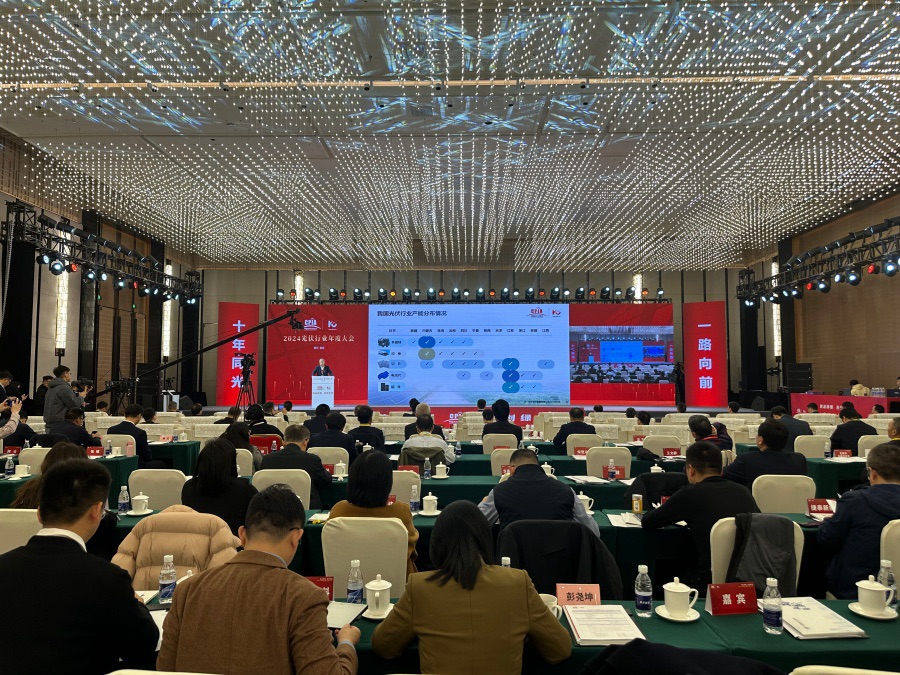On December 5, at the 2024 Photovoltaic Industry Annual Conference, organized by the China Photovoltaic Industry Association and the Yibin Municipal People’s Government, a dialogue session was held. Representatives from leading photovoltaic industry enterprises discussed and analyzed key topics, including how to phase out outdated production capacity, directions for technological innovation, supply and demand trends of main and auxiliary materials, the prospects of the energy storage market, and how the industry can self-regulate.
The dialogue session was moderated by Li Junfeng, the first director of the National Center for Climate Strategy and a standing council member of the China Energy Research Society. Participants included Zhong Baoshen, Chairman of LONGi Green Energy Technology Co., Ltd., Lu Chuan, Chairman of CHINT SOLAR/ASTRONERGY, Gu Yilei, Vice Chairman and President of the Solar Storage Group at Sungrow Power Supply Co., Ltd., Zhang Fayu, Chairman of Anhui Yingfa Ruineng Technology Co., Ltd., Xu Zhiqun, Chairman of Highview Solar Co., Ltd., and Zhou Tao, President of Huawei Technologies Co., Ltd.’s Smart Photovoltaic Product Line.
In the discussion on the role and contribution of the photovoltaic industry in the energy transition and its collaboration with other new energy sources, Gu Yilei emphasized that the development of new energy has gone through various technological routes, with photovoltaic and wind power emerging as the leading solutions. However, he noted that photovoltaics has greater potential and more flexible application scenarios. To address the key challenge of energy consumption in photovoltaic development, Gu proposed two solutions: multi-energy complementarity and the integration of photovoltaic and energy storage.

China’s photovoltaic industry has entered its fourth cycle, with each round bringing opportunities for technological upgrades, and each cycle’s progression driven by advancements in technology. Zhang Fayu stated that, as a supporting enterprise in the industry, overcoming a cycle requires endurance, raising the banner of high quality, and emerging victorious. “In every round of adjustment, it’s crucial to manage cash flow effectively and proceed with minimal cost,” said Lu Chuan. He emphasized the importance of seizing new opportunities in both domestic and international markets, focusing on solutions in the rapidly emerging differentiated markets, and forming new business models.
Alongside these four cyclical transitions, “self-discipline” has quietly become a high-frequency term. Xu Zhiqun stressed that for the industry’s healthy development, quality self-discipline is essential to foster healthy competition and protect the industry’s reputation for quality; price self-discipline is needed, with companies developing in line with their own capacities; and capacity utilization self-discipline is necessary to avoid excessive inventory and to position oneself as a long-distance runner in the industry.
Amid the ongoing structural adjustments in the industry, the issue of “involution” remains a hot topic. Zhong Baoshen candidly pointed out that excessive competition due to an oversupply of market players is the key factor in involution. He suggested that companies accelerate mergers and acquisitions, further improve technological standards, and integrate resources; strengthen intellectual property protection, create differentiated products, and promote sustainable, high-quality development. “Adequate competition and moderate monopolies, balancing autonomy and mutual restraint, are essential for the industry’s maturation,” Li Junfeng commented.
On the topic of fostering a healthy industrial ecosystem, the attendees shared their insights and offered solutions. Zhong Baoshen emphasized the importance of self-discipline, starting with individual companies, to collectively safeguard the authority of industry associations, ensuring rules, regulations, and boundaries for healthy development. Gu Yilei advocated for technological innovation and opposed disordered, low-price competition; focusing on core areas, increasing R&D investment, and enhancing market competitiveness; and collaborating to enter the global market, contributing to global climate issues. Lu Chuan called for unity in action to move out of the cycle more quickly. Zhang Fayu advised treating the industry with the same care as one would their own eyes. Xu Zhiqun recommended embracing competition while collaborating through division of labor. Zhou Tao concluded that only by establishing high-quality industrial policies, setting high standards, and producing high-quality products can the photovoltaic industry achieve high-quality development. (Liu Lu)


